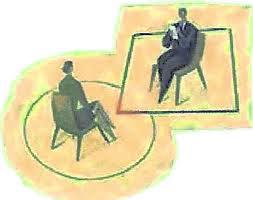Hi all, I was full of anticipation when I spoke to Therese Bogan, a very well known Marriage and Family Therapist in the San Francisco Area. So, we took this chance to dive a bit deeper in the world of marriage and couples' therapy. Naturally, we did it with an international flavor.

From your experience, how much does the multicultural/international element weigh on a family or couple?
I believe it carries a tremendous weight, and it goes quite deep down all the way into managing day-to-day basic needs like eating and housing. Culture is a very big part of any marriage. I have spent more than 10 years working both privately and with organizations in the San Francisco Bay area where predominantly the people that I work with are not monolingual, and are raising families with more than one culture. Usually, that means that they are first-generation immigrants or that they are temporarily transplants to the Bay area from their country, so here for specific work reasons or specific work assignments and also for specific periods of time. But I would say that I have done more family work with families that are here with a placement from a company for three to five years. That is the general definition of an international couple or family. They are setting up this temporary culture inside themselves and that is the corner stone of an international family’s experience: setting up this temporary culture that works within your couple’s relationship and then also within the family.
Are such couples more likely to develop certain types of issues?
I would say that there are two areas that are really impacted: Communication and Emotional Sharing.
Communication or language ability and their personal communication become deeply impacted depending how each person shifts into their cultural experience in their new environment. That, potentially, causes a lot of stress. And then stress issues really addiction, anger management, eating problems and the ability to create a social network. These are the main areas that come out of the language function. The reason why I highlight the eating problem is that when our language capacity that we become accustomed to in our couple gets high jacked by any stress, it does not matter if it is a new cultural setting or cultural shock or a major-light stressful event like the loss of a parent, or the loss of a job, any stressor will hit you in primal way. And one of the main ways that couples frequently communicate is over meals.
The other area that I was going to look at is, besides language, time management and travel proximity. How much time you spend literally face to face with your partner becomes a major issue. If you spend a predominant amount of your time online using online resources in order to stay connected, that is good but it reduces your sense of connectedness that can only happen face to face in the same environment. We need to feel each other’s nervous systems that are tuned to each other. And you can get a portion of that through online means or the telephone or a change in frequency but you cannot get the all thing.
This brings up emotional sharing. A couple with two cultures has two forms of sharing and story telling, and then they have the influence of the culture they are in ~ a third! One woman from Italy might tell her love story in a different way from her Swedish husband, and that’s often the interest and difference that charms many when falling in love. Although, when the story of love is brought to a new location, and the Italian love story is no longer reflected in media, friends-in-common, cultural expectations or daily living, then the story fades and is hard to translate. Its left to the international couple to craft their story together, retell it to each other, and then find themselves mirrored back in a foreign land. The two individuals might take this to heart in different ways, and many couples need support of their friends from home or family to find their way back to emotionally sharing with their partner.

Being multicultural, traveling often, moving to another country and generally dealing with a myriad a cultural differences cause stress. How do you help couples tackle and manage these factors?
The first thing that I really encourage a couple to do is to go back to their love history, their romantic history and their first few years of coupling. Couples should make a map of their personal culture together, the way in which their personal culture has been created by the couple. The couple is bombarded by a new environment and encouraged to abandon their personal culture, together as a couple. But if you have a detailed map, story or a strategic plan of how to set up your household.
Find out where match the new resources in the new environment
Find out where your culture will not be met in that new location
OR find out what the last location lacked
The couple can do that together, they can realize and raise their awareness around where their personal culture together, which is not being met in the environment and that represents good information about how they should be adjusting themselves together. Slowly overtime, I really feel like international couples’ personal culture together starts to be affected and changed by the culture that they find themselves in and, frankly, that is often the joy of being in an international couple. You have this exciting opportunity to absorb yourselves in this new environment and allow yourself individually to go through deep and profound changes. Your ability to explore your roots, drop them if you wish and challenge yourself to grow can be deeply rewarding. But, some couples find this to be a labyrinth of old hurts that leads to only a loss in communication and a loss of their usual sense of adult confidence.
Are there any particular therapy techniques and models that are particularly tailored to international couples?
The way therapy works is finding techniques and models that fit the couple. What I highly recommend is that couples seeking therapy in a new location that does not match their culture of origin to attempt to find a language match and if they cannot find their language of origin match, they should definitely try to find a language that they are comfortable speaking at home. Language is a really big and important issue and, therefore, it is critical in therapy as well.
Another key aspect in combining culture with therapy is in investigating and understanding how that specific couple built their family, what their cultural structure is. So it is best to match therapy and models that work with their culture of origin.
Constellation therapy, for instance, which is very European, is a family therapy model, but it can also be used with couples. What they do is that they take their family of origin, the men’s parents and his parents’ parents and you make a genealogical map. It is less about where these people were born and where they went to school and more about what their relationships were and what type of dynamics were created in those families of origin. That is a very European way of thinking and it works quite well for couples that need the support to create the love map that I was describing.
If the couple of origin comes from Asia, that map in general might work as well. Asian cultures are ancestor-based cultures so they feel actually excited and feel good to do the work to look at the way other relationships in their families were created. But it also could be quite offensive because in some Asian cultures it is considered offensive to take a look at the way elders or ancestors have operated and critique it.
The challenge of doing therapy internationally or for international couples is in identifying their culture of origin and how they work and what works best for them. One way that is quite general and often works for many cultures is ecological psychology. That form of family therapy is based on systems family therapy and crossed psychology. The way it works is that you are creating a map, even if you may not write something down on paper, but instead discussing and sometimes acting out in role playing different aspects of yourself as a couple as you are now today so that you understand different environments that you have been in and that you will be going to and that you are temporarily in now as if it is an ecosystem. What couples do there is to watch and observe how their awareness and their communication and their emotional means are being expressed in these different eco-pods. Each has its own eco-system and eco-systems are related but they are not the same. So they have the opportunity and start to see where they can function, where they are functioning together and where they are not functioning together.
Share with us your experiences, leave us a comment!
----

